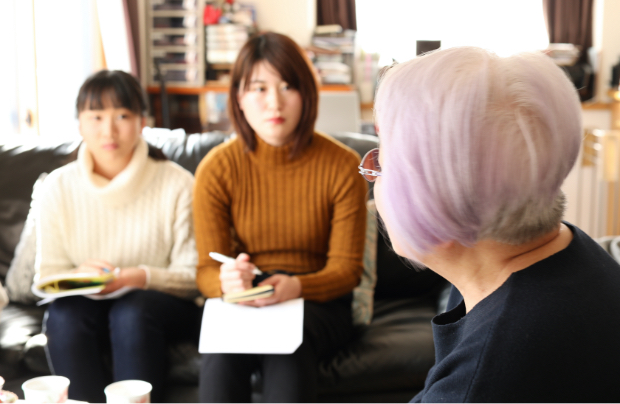HIROSHIMA memory keepers Pass down a story
Vol. 18 2022.8.22 up
When my mother said to me,“Keiko-chan, death isn’t terrible. It isn’t frightening,” I thought, “Oh, that airplane is going to drop a bomb. And then, I’ll die.” Looking back now, it is amazing that a nine-year-old girl prepared for her death, then.
Keiko Nakagawa
A-bomb survivor

What do people handing down the experience of the A-bombing think and try to convey?
Ms. Keiko Nakagawa was exposed to the A-bombing in Koi, located 3.4km west of the hypocenter. She has told her A-bomb experience to 25 participants. After her story, some of them asked questions of her.
Section
About Ms. Nakagawa’s family
How old were you when the A-bomb was dropped ?
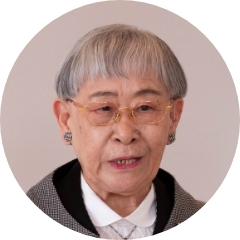
I was a fourth grader in the national school.
Now, you call a national school an elementary school, don’t you?
I was nine years old
then, though I’ve gotten old now.
Did you have any brothers and sisters?

Yes.My parents had three daughters. I was the eldest.
Actually, we were four sisters, but the third one passed away from meningitis resulting from a worsened cold when she was a year and eight months old.
On the day of the A-bombing, four of us were in Hiroshima—my mother (32), me (9), my second sister (6), and my seven-month-old sister.
Was your father in Hiroshima?
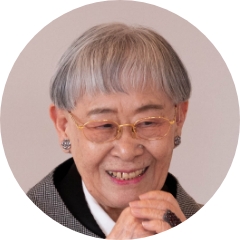
No,he wasn't it in Hiroshima.During wartime, he worked at the consulate in Beijing.
Our family also lived in Beijing for two months from August, 1941.
While in Beijing, our family was my father, my mother, me and my younger sister.
I have a memory that we had a fun time every day in China. For example, our family went together to a hotel or a department store restaurant to eat spaghetti. I was just happy to be with my family.
However, we returned to Hiroshima leaving my father behind, because living in Beijing with yellow sand and dirty air was bad for our health.
Before and during the war

Tell us what Hiroshima was like before the war.
There were many old wooden houses in Hiroshima.
The Fukuya Department Store was there before the war,
and a theater called kabukiza was across from the department store.
My great-grandmother loved me very much, so she often took me to a movie theater or stores on Hondori Street, the main shopping street.
I remember she bought me many cute dresses.
I loved to hear my great-grandmother tell the story about the old Hiroshima in the 1850s.
Like when she married a money changer in Otemachi. Or when the warehouse on the grounds of her house was attacked by a peasant riot. Or in Hachobori, there were waterways, as you can see from its name, and foxes appeared every night, howling and barking.
This favorite great-grandmother was exposed to the A-bombing in Higashi Kanon-machi. After she fled to our house, she vomited blood or had blood stools and passed away on August 9.
How did children like you play during the war time?

We had no TV then, and the voices on the radio, which should have been our only entertainment, were often broken and difficult to hear.
Therefore, we enjoyed physical exercise.
Outside,we played with a rubber jump rope or a game of tag.
Inside the house, we were juggling bags, doing string figures or karuta, traditional Japanese playing cards.
I often competed with my friends, juggling bags or making string figures.
What kind of food did you eat before or during the war?
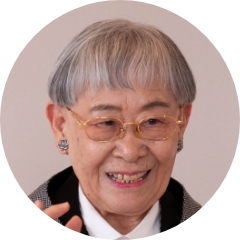
Until 1943, when I was a second grader, we were able to live an ordinary life without experiencing a lack of food.
My mother cooked tofu, meat and potatoes, raw egg rice with soy sauce and vegetable soup.
We also ate Morinaga caramel and Meiji chocolate.
However, in 1944 one year before the A-bombing, food became scarce.
Our family members of four shared a small amount of rationed rice which just fit in our palms.
On a wood-burning stove, we had to cook without soup stock using a small amount of rice, about 1cm cut radish, sweet potatoes and potatoes to increase the volume.
In those days, roads were not paved, so we plowed the small land along a ditch in front of our house and planted sweet potatoes and potatoes.
We went to a stream to pick wild parsley and catch small shrimp.
What were you thinking about the war while young?
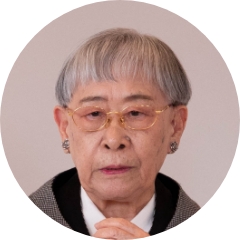
As I grew up under militarism, I didn’t have an idea that war was not right.
After the war, our education changed, and I came to think that war is wrong.
So you see, education is important.
Now, diversity is respected, but in those days, ideas and behavior different from others were clamped down.
I later heard that during war time my mother had thought, “We won’t be able to win the war. I hate war.” If this idea of hers would have been heard by our neighbors, they would have informed her to the police. It was a terrible time.

Was there racism or prejudice among people during war time?
Yes.When we lived in Beijing, I saw Japanese people hit or kick the Chinese. Since then, I have wanted to apologize to the Beijing people for that behavior.
Once, during wartime, I was lining up for food distribution with my mother near Koi National School. I witnessed a B-29 American military aircraft hit by a surface-to-air missile and crash. I watched the airplane spiraling down after being hit, and an American soldier floating down with a parachute. People around me saw this and cheered with delight, “Hurrah! Hurrah!”
I was just holding my mother’s hand, thinking, “Poor man!”
August 6
Where were you on August 6, when the A-bomb was dropped?
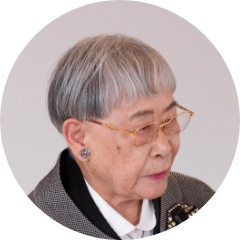
I was at home in Koi, located 3.4km west of the hypocenter.
When we returned from Beijing to Japan, we moved from Tenma-cho, which was close to the city center, to Koi, a suburb in Hiroshima. We thought Koi would be safer from bombing.
In those days, Koi was in the country full of farm fields.

Tell us about what happened when the A-bomb was dropped?
I had school on August 6, but I had a fever the night before, so I took a break from school and was in bed.
I still remember that the loquat leaves in the garden were glittering in the sun, which was beautiful.
My mother said to me, “Keiko-chan! Eat breakfast.” I got out of my futon and sat straight at a low dining table to eat porridge. Suddenly, there was a flash,an orange color closer to red.
My whole visual field was so totally stained in orange that I lost sight of my mother sitting next to me.
The moment I stood up thinking, “What happened?” the house collapsed, and the windows were shattered with the boom. I had no idea what had happened.Before I knew it, the interior of our house was crushed and blown glass shards pierced me.
My mother was also injured. We found my seven-month-old sister, crying, wrapped in the curtain and went out of the house. My six-year-old sister, playing outside, was blown away but miraculously had no injuries. After we confirmed that all of us were safe, we went to the near-by air raid shelter.
Three houses nearby were burning, which might have been caused by the heat rays. The shelter was filled with injured and dying people, so we couldn’t enter it.
After a while, many people who had been seriously burned came fleeing from the city center.
All of them looked terrible. One was a pitch-black woman who fled here holding her dead baby.
That night, we pulled futons out of our house to lay them on the grove covered with overgrown weeds in a mountain in Koi and slept there.
At night, an American spy plane came flying by, blinking its red light.
When my mother said to me, “Keiko-chan, death isn’t terrible. “It isn’t frightening,” I thought, “Oh, that airplane is going to drop a bomb. And then, I’ll die.”
Looking back now, it is amazing that a nine-year-old girl was prepared for her death then.
What was your life like from the next day when the A-bomb was dropped?

The world had completely changed when I woke up.
I didn’t know what to do with nothing left in our broken house.
My memory on that day is ambiguous, probably because my mind got numb.
I have one clear memory that my mother handed me a white rice ball.
In those days, white rice was very precious, so we couldn’t eat it. That’s why that rice ball was so delicious that I still remember its taste.
When I asked my mother, “Where did this come from?” she answered, “It might have come from a neighboring prefecture, Okayama.”
My mother seemed to think that the entire Hiroshima Prefecture was completely destroyed. However, actually I learned later that those rice balls were sent by a women’s association in Ishiuchi, north-west of Hiroshima city.
Another thing I remember is going to our neighbor’s house to ask for well water. My mother carried her seven-month-old baby on her back, and my younger sister and I walked with our hands holding the hem of her clothes.
Life after the war
When did your school reopen?

I am not sure, but an old classmate of mine said, “After our school reopened in fifth grade, we sometimes went to school and left in the afternoon.” So, I think our school reopened before our new school year began, but not completely.
I hardly remember studying at school until in sixth grade.
When I was in third grade, Japan was in the middle of war. When I was in fourth grade, the A-bomb was dropped. When I was in fifth grade, we still couldn’t study enough just after the war was over.
In order to avoid American air attacks during wartime, we studied hiding in a mountain, sitting on straw mats with a small blackboard set up in front of us.
I often talk with my old school friends, saying, “We are very bright. We can write kanji even though we didn’t have much education at school.”
So, I think you will not have any problem if you sometimes skip school (laughs).
After the A-bombing, the school grounds of Koi National School were temporarily turned into a crematory.
I remember the smell was very bad, and it stayed on for months.
What was Hiroshima like after the war?

In 1948, three years after the war, I passed the entrance examination and entered Hiroshima Jogakuin Junior and Senior High School.
Every morning, I took a streetcar from Koi to school, which was always very jammed.
In those days, the labor movement was strong and many strikes took place. Streetcars often stopped running because of strikes, and every time there was a strike, I had to walk to school from Koi.
The shortage of food was serious during 1946-1948. We often visited farmers in the countryside and exchanged our kimonos for rice.
Using the rice, we made thin rice porridge or barley rice with very little rice.
When we had rationed potatoes and sugar, we made our favorite treat.
We mashed the boiled potatoes and added some sugar and vinegar to make something like potato salad you are familiar with. We liked it very much and ate it often.
In the postwar period, houses still remained damaged, and people were living in poverty.
A lot of men died in the war, so there were many fatherless children.
Thoughts you hope to pass on to future generations

Would you tell us what made you start to tell your experience on August 6th to children and young people?
To tell the truth, I was never inclined to talk about the A-bombing until I was in my seventies because that event was the last thing I wanted to remember.
But I began thinking, “I am a living witness of the A-bombing. Shouldn’t I tell my story to the next generations who are going to bear our future?” When I was around 76, I started to tell my story whenever a request came.
Do you think Japan is now a peaceful country?

I think it is. But, today the world is threatened by the Russian invasion of Ukraine.I hope it won’t develop into another world war. If possible, I want both parties to have a successful conversation to stop it.
Other than a conversation, what do you think would stop the war?

It is a difficult question. I don’t know.
Yes, it is. I understand how you feel. It is easy to say, “War is wrong,” but all of us here have to think about the cause of the war and find out the way to prevent it.

Yes, you are right.I am very happy to have had a peaceful life until now.
When I lost my beloved aunt and great-grandmother in the A-bombing, I didn’t cry because I felt too numb inside. Now I am tearing up. It is really regrettable that they were killed indiscriminately in the A-bombing.
Nuclear weapons must never be used again.
When will wars come to an end?
I feel a pain in my chest when I think of any war.
Thank you for telling us your precious story.
Interviewed on June 2022.
About
"Interviews with HIROSHIMA memory keepers" is a part of project that Hiroshima「」– 3rd Generation Exhibition: Succeeding to History
We have recorded interviews with A-bomb survivors, A-bomb Legacy Successors, and peace volunteers since 2015.
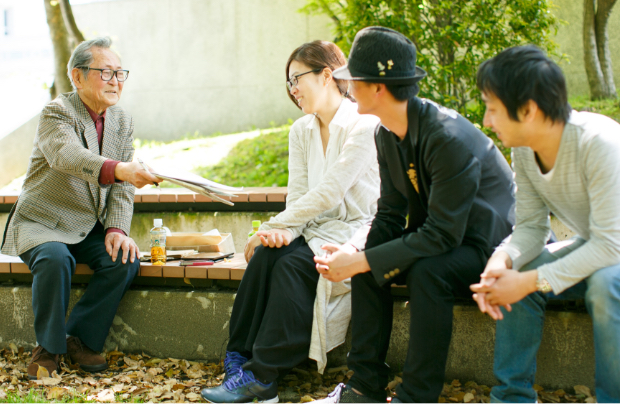
What are Hiroshima memory keepers feeling now, and what are they trying to pass on?
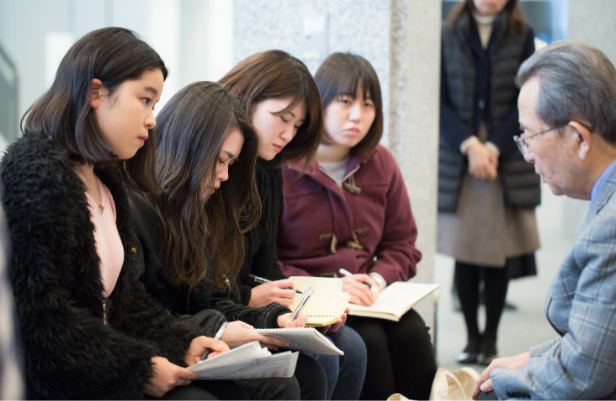
What can we learn from the bombing of Hiroshima? What messages can we convey to the next generation? Please share your ideas.
